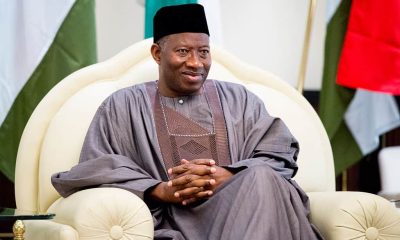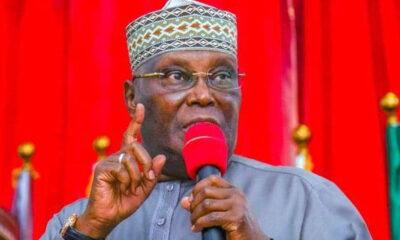Opinion
How to stop judicial coups against democracy in Nigeria – Farooq Kperogi

How to stop judicial coups against democracy in Nigeria – Farooq Kperogi
The Civil Society Legislative Advocacy Centre (CISLAC), one of Nigeria’s most prominent pro-democracy NGOs, invited me to make a virtual presentation from my base in Atlanta to a national seminar it organized last Thursday on “targeted judicial reforms and enhanced judicial integrity in post-election litigation.” Unfortunately, I couldn’t make it, but here are the thoughts I would have shared on the topic.
It’s oddly ironic that the judiciary, which should be the bulwark of democracy, has become such a dreadful terror to democracy that people are seeking to protect democracy from it. The courts have become the graveyards of electoral mandates. Judges have not only descended to being common purchasable judicial rogues, but they have also become juridical coup plotters.
The major preoccupation of pro-democracy activists is no longer how to keep the military from politics and governance but how to save democracy from the judiciary. In other words, in Nigeria, our problem is no longer fear of military coups but the cold reality of frighteningly escalating judicial coups.
A “judicial coup,” also called a juridical coup d’état, refers to a situation where judicial or legal processes are deployed to subvert the choice of the electorate or to unfairly change the power structure of an existing government.
In other words, a judicial coup occurs when the courts are used to achieve political ends that would not be possible through standard political processes. In a judicial coup, the courts make rulings or interpretations of the law that drastically alter the balance of power, often favoring a particular political group or leader.
READ ALSO:
- Nigerians to get passports 3 weeks after application – Immigration boss
- BREAKING: CBN to freeze bank accounts without BVN, NIN [see date]
- Patients flee as NANS factions storm National Hospital, Abuja
This can include invalidating election results, removing elected officials from office, altering the constitution through interpretive tyranny, or other significant legal actions that have profound political implications.
Before 2023, judicial coups happened in trickles and were barely perceptible. The big, bad bugaboo used to be INEC. When the Supreme Court made Chibuike Rotimi Amaechi the governor of Rivers State on October 25, 2007, without winning a single vote, we thought it was merely a curious, one-off democratic anomaly that was nonetheless morally justified because Celestine Omehia—who won the actual votes cast on April 14, 2007, and sworn in as the governor on May 29—was illegally replaced as PDP’s candidate after Amaechi won the party’s primary election.
Our collective toleration of this strange supersession of normal democratic procedures to produce a governor conduced to more aberrations.
On January 14, 2020, the Supreme Court produced its first unofficial “Supreme Court governor” in Hope Uzodimma of Imo State when it used dazzlingly fraudulent judicial abracadabra to subvert the outcome of the governorship election in the state.
The Supreme Court’s judicial helicopter zoomed past PDP’s Emeka Ihedioha who won 273,404 votes to emerge as the winner of the election; flew past Action Alliance’s Uche Nwosu who came second with 190,364 votes; zipped past APGA’s Ifeanyi Ararume who came third with 114,676 votes; and glided gently into the yard of fourth-place finisher Uzodimma of APC with only 96,458 votes.
It then declared that the fourth shall be the first, enthroned Uzodimma as the governor, and dethroned Ihedioha whom Imo voters and INEC had chosen as the legitimate governor.
I recall being too numb by the scandal of the judgment to even experience any sensation of righteous indignation. Then came the Ahmed Lawan judgment, and I was jolted to my very bones. A man who didn’t run for an election, who admitted he didn’t run for an election, and who gave up trying to steal an election that he himself admitted he didn’t run for, much less win, was declared the “winner” of the election.
Because I closely followed the case and shaped public discourse on it, I was so incensed by the judgment that, in a viral February 6 social media post, I called Supreme Court justices “a rotten gaggle of useless, purchasable judicial bandits,” which prompted an unexampled official response from the Supreme Court, which dripped wet with undiluted bile.
READ ALSO:
- Passengers will have no contact with Immigration from February 2024 – FG
- More deaths as Israel unleashes massive bombs on Gaza
- Fake US military officer jailed in Kaduna
However, many judges, including some conscientious Supreme Court judges, agreed with me. For example, in his farewell speech last month, Justice Musa Dattijo Muhammad re-echoed my sentiments about the Supreme Court and cited former Court of Appeal justice Oludotun Adefope-Okojie who, in her own farewell speech, approvingly quoted my description of Supreme Court justices as “a rotten gaggle of useless, purchasable judicial bandits.”
The judicial banditry I talked about has assumed a different, worrying dimension. It has now become full-on judicial sabotage against the soul of democracy itself. In unprecedented judicial roguery, the Appeal Court has invalidated the election of all 16 PDP lawmakers in the Plateau State House of Assembly and handed unearned victories to APC. It also nullified the victory of PDP’s Governor Caleb Mutfwang and asked that APC’s Nentawe Yilwatda Goshwe, who lost in the actual election, be declared the winner.
In all these cases, the judiciary invoked matters that were extraneous to the actual vote (called “technicalities”) to decide whom to crown as winners of the elections.
It’s now so bad that courting the votes of the electorates is no longer an important component of the democratic process since politicians can get from the courts what they lost at the ballot box. That’s a dangerous state for any democracy to be in.
The judiciary is becoming an unacceptably treacherous but overpampered monster that is exercising powers that are beyond the bounds of reason. It needs to be stopped through a holistic reworking of the electoral act.
The first thing that needs to be spelled out more clearly and more forcefully in a revised electoral act is that pre-election matters are not litigable after the winner of an election has been announced. All pre-election petitions should be litigated before the conduct of elections. Post-election litigations should be limited to the conduct of the elections. Since this happens once in four years, it should not be too much of a burden for the judiciary.
READ ALSO:
- IPOB kicks as Enugu governor calls group ‘proscribed’
- Mohbad’s wife requested DNA tests from US hospital, 2 others — Iyabo Ojo
- Gunmen abduct catholic priest, driver in Imo
The second change that needs to be enshrined in a revised electoral act is a provision that divests courts of the powers to declare winners and losers of electoral contests. I am the first to admit that this is problematic because it limits the mechanism for redress available to politicians in cases of INEC-engineered electoral robberies.
But in situations where courts can glibly overrule the will of the electorate by invoking procedural inanities that are extrinsic to elections to declare winners and losers, I would rather deal with INEC alone.
The conduct of elections can be improved in the future to the point that manipulations can be significantly reduced. But I can’t say the same for a rapacious, unjust, and mercenary judiciary such as we have today.
In any case, in all functional democracies, it is voters, not the courts, who elect and remove people from positions of political power. If the courts find sufficient evidence of irregularities in the conduct of elections, they can order a rerun. But they should never be invested with the power to declare winners and losers.
The last suggestion I have for the revision of the electoral act is to constitutionalize the imperative to finalize the adjudication of all election petitions before the inauguration of elected officials into their offices. There are two reasons for this.
First, it is disruptive to put elected officials through the hassles of post-election litigation while they are already officially in office. Governance is often put on hold during the pendency of litigations, and lots of state resources are expended to bribe judges, hire lawyers, and bring witnesses. That’s unfair to Nigerians.
Second, at least at the presidential level, once someone has been declared the president and is inaugurated, they automatically assume enormous symbolic power that is almost impossible to reverse. They also have access to enormous resources that they can deploy to influence the course of justice.
Whatever we do, we must curb the excesses of our out-of-control judiciary before it finally murders what remains of our democracy.
How to stop judicial coups against democracy in Nigeria – Farooq Kperogi
Farooq Kperogi is a renowned Nigerian newspaper columnist and United States based Professor of Journalism.
Opinion
El Rufai’s Arise News mind game with Ribadu, By Farooq Kperogi

El Rufai’s Arise News mind game with Ribadu, By Farooq Kperogi
El Rufai’s Arise News mind game with Ribadu, By Farooq Kperogi
Opinion
Oshiomhole: Behold the 13th disciple of Christ

Oshiomhole: Behold the 13th disciple of Christ
Opinion
AFCON 2025: Flipping Content Creation From Coverage to Strategy

AFCON 2025: Flipping Content Creation From Coverage to Strategy
By Toluwalope Shodunke
The beautiful and enchanting butterfly called the Africa Cup of Nations (AFCON) emerged from its chrysalis in Khartoum, Sudan, under the presidency of Abdelaziz Abdallah Salem, an Egyptian, with three countries—Egypt, Sudan, and Ethiopia—participating, and Egypt emerging as the eventual winner.
The reason for this limited participation is not far-fetched. At the time, only nine African countries were independent. The remaining 45 countries that now make up CAF’s 54 member nations were either pushing Queen Elizabeth’s dogsled made unique with the Union Jack, making supplications at the Eiffel Tower, or knocking at the doors of the Palácio de Belém, the Quirinal Palace, and the Royal Palace of Brussels—seeking the mercies of their colonial masters who, without regard for cultures, sub-cultures, or primordial affinities, divided Africa among the colonial gods.
From then until now, CAF has had seven presidents, including Patrice Motsepe, who was elected as the seventh president in 2021. With more countries gaining independence and under various CAF leaderships, AFCON has undergone several reforms—transforming from a “backyard event” involving only three nations into competitions featuring 8, 16, and now 24 teams. It has evolved into a global spectacle consumed by millions worldwide.
Looking back, I can trace my personal connection to AFCON to table soccer, which I played alone on concrete in our balcony at Olafimihan Street—between Mushin and Ilasamaja—adjacent to Alafia Oluwa Primary School, close to Alfa Nda and Akanro Street, all in Lagos State.
Zygmunt Bauman, the Polish-British sociologist who developed the concept of “liquid modernity,” argues that the world is in constant flux rather than static, among other themes in his revelatory works.
For the benefit of Millennials (Generation Y) and Generation Z—who are accustomed to high-tech pads, iPhones, AI technologies, and chat boxes—table soccer is a replica of football played with bottle corks (often from carbonated drinks or beer) as players, cassette hubs as the ball, and “Bic” biro covers for engagement. The game can be played by two people, each controlling eleven players.
I, however, enjoyed playing alone in a secluded area, running my own commentary like the great Ernest Okonkwo, Yinka Craig, and Fabio Lanipekun, who are all late. At the time, I knew next to nothing about the Africa Cup of Nations. Yet, I named my cork players after Nigerian legends such as Segun Odegbami, Godwin Odiye, Aloysius Atuegbu, Tunji Banjo, Muda Lawal, Felix Owolabi, and Adokiye Amiesimaka, among others, as I must have taken to heart their names from commentary and utterances of my uncles resulting from sporadic and wild celebrations of Nigeria winning the Cup of Nations on home soil for the first time.
While my connection to AFCON remained somewhat ephemeral until Libya 1982, my AFCON anecdotes became deeply rooted in Abidjan 1984, where Cameroon defeated Nigeria 3–1. The name Théophile Abéga was etched into my youthful memory.
Even as I write this, I remember the silence that enveloped our compound after the final whistle.
It felt similar to how Ukrainians experienced the Battle of Mariupol against Russia—where resolute resistance eventually succumbed to overwhelming force.
The Indomitable Lions were better and superior in every aspect. The lion not only caged the Eagles, they cooked pepper soup with the Green Eagles.
In Maroc ’88, I again tasted defeat with the Green Eagles (now Super Eagles), coached by the German Manfred Höner. Players like Henry Nwosu, Stephen Keshi, Sunday Eboigbe, Bright Omolara, Rashidi Yekini, Austin Eguavoen, Peter Rufai, Folorunsho Okenla, Ademola Adeshina, Yisa Sofoluwe, and others featured prominently. A beautiful goal by Henry Nwosu—then a diminutive ACB Lagos player—was controversially disallowed.
This sparked outrage among Nigerians, many of whom believed the referee acted under the influence of Issa Hayatou, the Cameroonian who served as CAF president from 1988 to 2017.
This stroll down memory lane illustrates that controversy and allegations of biased officiating have long been part of AFCON’s history.
The 2025 Africa Cup of Nations in Morocco, held from December 21, 2025, to January 18, 2026, will be discussed for a long time by football historians, raconteurs, and aficionados—for both positive and negative reasons.
These include Morocco’s world-class facilities, the ravenous hunger of ball boys and players (superstars included) for the towels of opposing goalkeepers—popularly dubbed TowelGate—allegations of biased officiating, strained relations among Arab African nations (Egypt, Algeria, Tunisia, and Morocco), CAF President Patrice Motsepe’s curt “keep quiet” response to veteran journalist Osasu Obayiuwana regarding the proposed four-year AFCON cycle post-2028, and the “Oga Patapata” incident, where Senegalese players walked off the pitch after a legitimate goal was chalked off and a penalty awarded against them by DR Congo referee Jean-Jacques Ndala.
While these narratives dominated global discourse, another critical issue—less prominent but equally important—emerged within Nigeria’s media and content-creation landscape.
Following Nigeria’s qualification from the group stage, the Super Eagles were scheduled to face Mozambique in the Round of 16. Between January 1 and January 3, Coach Eric Chelle instituted closed-door training sessions, denying journalists and content creators access, with media interaction limited to pre-match press conferences.
According to Chelle, the knockout stage demanded “maximum concentration,” and privacy was necessary to protect players from distractions.
This decision sparked mixed reactions on social media.
Twitter user @QualityQuadry wrote:
“What Eric Chelle is doing to journalists is bad.
Journalists were subjected to a media parley under cold weather in an open field for the first time in Super Eagles history.
Journalists were beaten by rain because Chelle doesn’t want journalists around the camp.
Locking down training sessions for three days is unprofessional.
I wish him well against Mozambique.”
Another user, @PoojaMedia, stated:
“Again, Eric Chelle has closed the Super Eagles’ training today.
That means journalists in Morocco won’t have access to the team for three straight days ahead of the Round of 16.
This is serious and sad for journalists who spent millions to get content around the team.
We move.”
Conversely, @sportsdokitor wrote:
“I’m not Eric Chelle’s biggest supporter, but on this issue, I support him 110%.
There’s a time to speak and a time to train.
Let the boys focus on why they’re in Morocco—they’re not here for your content creation.”
From these three tweets, one can see accessibility being clothed in beautiful garments. Two of the tweets suggest that there is only one way to get to the zenith of Mount Kilimanjaro, when indeed there are many routes—if we think within the box, not outside the box as we’ve not exhausted the content inside the box.
In the past, when the economy was buoyant, media organisations sponsored reporters to cover the World Cup, Olympics, Commonwealth Games, and other international competitions.
Today, with financial pressures mounting, many journalists and content creators seek collaborations and sponsorships from corporations and tech startups to cover sporting events, who in turn get awareness, brand visibility, and other intangibles.
As Gary Vaynerchuk famously said, “Every company is a media company.” Yet most creators covering AFCON 2025 followed the same playbook.
At AFCON 2025, most Nigerian journalists and content creators pitched similar offerings: on-the-ground coverage, press conferences, team updates, behind-the-scenes footage, analysis, cuisine, fan interactions, and Moroccan cultural experiences.
If they were not interviewing Victor Osimhen, they were showcasing the stand-up comedy talents of Samuel Chukwueze and other forms of entertainment.
What was missing was differentiation. No clear Unique Selling Proposition (USP). The result was generic, repetitive content with little strategic distinction. Everyone appeared to be deploying the same “Jab, Jab, Jab, Hook” formula—throwing multiple jabs of access-driven content in the hope that one hook would land.
The lesson is simple: when everyone is jabbing the same way, the hook becomes predictable and loses its power.
As J. P. Clark wrote in the poem “The Casualties”, “We are all casualties,” casualties of sameness—content without differentiation. The audience consumes shallow content, sponsors lose return on investment, and creators return home bearing the “weight of paper” from disappointed benefactors.
On November 23, 1963, a shining light was dimmed in America when President John F. Kennedy was assassinated.
As with AFCON today, media organisations sent their best hands to cover the funeral, as the who’s who of the planet—and if possible, the stratosphere—would attend. Unconfirmed reports suggested that over 220 VVIPs were expected.
While every newspaper, radio, and television station covered the spectacle and grandeur of the event, one man, Jimmy Breslin, swam against the tide. He chose instead to interview Clifton Pollard, the foreman of gravediggers at Arlington National Cemetery—the man who dug John F. Kennedy’s grave.
This act of upended thinking differentiated Jimmy Breslin from the odds and sods, and he went on to win the Pulitzer Prize in 1986.
Until journalists and content creators stop following the motley and begin swimming against the tide, access will continue to be treated as king—when in reality, differentiation, aided by strategy, is king.
When every journalist and content creator is using Gary Vaynerchuk’s “Jab, Jab, Jab, Hook” template while covering major sporting events, thinkers among them must learn to replace one jab with a counterpunch—and a bit of head movement—to stay ahead of the herd.
Toluwalope Shodunke can be reached via tolushodunke@yahoo.com
-

 News1 day ago
News1 day agoSaudi Arabia Confirms Sighting of Ramadan Crescent, Fasting Begins Wednesday
-

 metro2 days ago
metro2 days agoUS Freezes Assets of Eight Nigerians Over Boko Haram, ISIL, Cybercrime Links
-

 metro1 day ago
metro1 day agoLagos Woman Shares Ordeal After Alleged Rape, Sparks Nationwide Outcry
-

 News24 hours ago
News24 hours agoRamadan Begins in Nigeria as Sultan Confirms Crescent Sighting
-
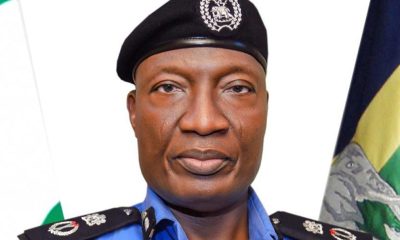
 Entertainment2 days ago
Entertainment2 days agoMystery in Lekki: Police Probe Death of Two Nollywood Crew Found Lifeless in Parked Car
-

 metro2 days ago
metro2 days agoTerror in Lagos Traffic: Cutlass Gang Unleashes Mayhem on Mile 12–Ketu Road
-
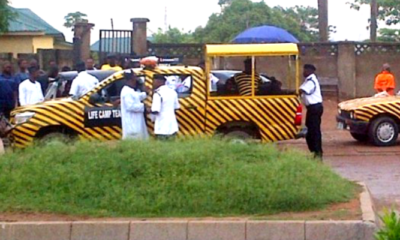
 Auto2 days ago
Auto2 days agoAppeal Court Ruling on VIO Limited to Abuja, Not Lagos — LASG
-
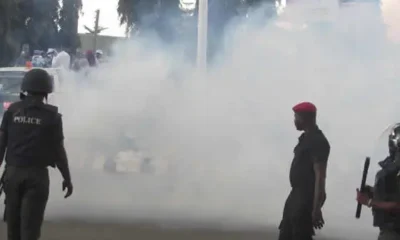
 News2 days ago
News2 days agoTeargas, Chaos at EFCC as El-Rufai’s Supporters Clash with Security Operatives





